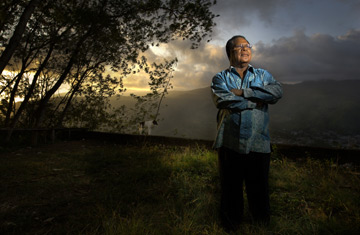
The news about Indonesia's forests is rarely good. Countless stories detail rapid deforestation, perennial fires and illegal logging. Positive reports from Papua, the country's easternmost province, are especially rare; Papua has a history of separatist activity, extensive poverty and the country's highest HIV rates.
So Barnabas Suebu comes as a welcome relief. The new Governor of Papua, which comprises the western half of New Guinea island, wants to protect the province's forests, home to fully half of Indonesia's native species. That means standing up to the deeply entrenched business and military interests that have richly profited from Papuan timber. "We have to save the forests before it is too late," says Suebu, 61. "If we do that, we can help save the planet and alleviate poverty at the same time."
Since taking office in July 2006, Suebu has made plans to declare a moratorium on log exports and recommended that no new logging concessions be granted to timber companies. The Papua native has also begun talks on trading carbon credits to help protect the province's forests, which extend over an area estimated at 77 million acres (31 million hectares). If a deal with the Australia-based company Carbon Conservation goes through, Suebu says Papua can generate far more revenue by trading credits on the Chicago Climate Exchange than it currently gets from logging. "Why would we cut down trees if people are going to pay us to protect them?" he asks. "We can prevent deforestation and also use the money to reforest the areas in critical condition." More money in public coffers would help improve education, health and sanitation for the province's 2 million people, 80% of whom live in poverty. Suebu, Papua's first directly elected Governor, has made easing their plight the main focus of his five-year term.
The Indonesian government in Jakarta, however, is keen to promote biofuel production, and it could require Papua to set aside 5 million acres (2 million hectares) of forest for palm-oil plantations. Suebu says that the legal autonomy the province has when it comes to resource management will help him take on Jakarta. "Pressure on our forests is coming from the forestry department because they are still operating with an old mindset," he explains. "They need to realize that there is a new paradigm now and we are not going to repeat the mistakes of the past." The challenges are endless, but so is the Governor's optimism — a commodity that until now has been in short supply in this corner of the globe.